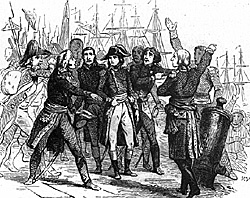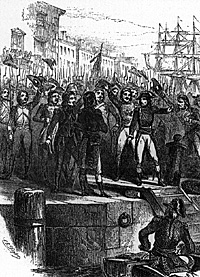 On paper, the French navy still appeared formidable. Its proud history included vital assistance at the siege of Yorktown during the American Revolution. The French naval victory
at Yorktown (Second Battle of the Capes, 5-9 September, 1781) led to American independence.
On paper, the French navy still appeared formidable. Its proud history included vital assistance at the siege of Yorktown during the American Revolution. The French naval victory
at Yorktown (Second Battle of the Capes, 5-9 September, 1781) led to American independence.
At right and below are two period views showing General Bonaparte's
departure from Toulon on 19 May, 1798. Believing in his own destiny, the young Napoleon wagered his future on a risky enterprise. Ironically, his fame would grow despite its ultimate failure..
However, the French navy descended into chaos during the French Revolution. Naval officers, all of whom were aristocrats, oft went into exile or fell victim to the Terror. Under the new
regime, their places were taken by petty officers and others who were generally good sailors, but deficient in naval tactics. There was also a lack of experienced sailors, with the French
army often providing soldiers to man the cannon aboard the ships.
In spite of the British
blockade, French ships
were able to get to sea...
In spite of the British blockade, French ships were able to get to sea, and French officers and crews were gaining valuable experience which allowed them to achieve some successes against the British. In 1796 French ships had sailed to Ireland without challenge, anchored in Bantry Bay, and returned.
The uncanny ability of the French to escape from the blockade and end up in places like Bantry Bay was more than a little disconcerting to the British.
England's navy had its own problems during this period. In addition to suffering from a shortage of seamen, the miserable treatment of the ordinary sailor led to two serious mutinies in 1797. The Spithead mutiny (16 April to 15 May) resulted in little bloodshed and was resolved without reprisals; in the end it resembled a modern day labor dispute more than a violent insurrection.
 The Nore mutiny (12 May to 13 June), which took place on the Thames, was a more radical insurrection involving rioting and looting that spread ashore. The mutineer's elected leader, Richard Parker, inspired by some of the winds of revolution from across the channel, proclaimed a "Floating Republic". Ultimately, the mutiny collapsed, and Parker paid for his audacity at the end of a rope. None the less, the British government was shaken to the core.
The Nore mutiny (12 May to 13 June), which took place on the Thames, was a more radical insurrection involving rioting and looting that spread ashore. The mutineer's elected leader, Richard Parker, inspired by some of the winds of revolution from across the channel, proclaimed a "Floating Republic". Ultimately, the mutiny collapsed, and Parker paid for his audacity at the end of a rope. None the less, the British government was shaken to the core.
Since Yorktown the British had not won a major action at sea until 1 June, 1794, which may be why they called it the "Glorious First of June". Even then it was viewed by the French as a victory for France because although they lost seven warships they succeeded in getting 130 merchant ships through to Brest with vital foodstuffs from America.
The biggest naval action after that was on 23 June, 1795 when the British took three French vessels at Quiberon Bay. Except for many minor, inconclusive engagements, the next British victories were against the Spanish on 14 February, 1797 at Cape St. Vincent, and the Dutch on 11 October, 1797 at Camperdown (although the British were badly battered in the latter fight and none of the Dutch vessels taken were usable thereafter).
... British superiority at sea
did not seem so certain in 1798...
Thus, given the lack of any decisive naval victories against the French since the mutinies, British superiority at sea did not seem so certain in 1798. That perception would change in less than three months after Napoleon's expedition set sail for Egypt.
More Battle of the Nile 1798
-
Battle of the Nile 1798: Introduction
Battle of the Nile 1798: French and British Navies
Battle of the Nile 1798: French Luck and British Pursuit
Battle of the Nile 1798: French Success and British Frustration
Battle of the Nile 1798: Battle of Aboukir Bay
Battle of the Nile 1798: British Campaign Medal
Battle of the Nile 1798: French and British Order of Battle
Battle of the Nile 1798: Large Voyage and Pursuit Maps (very slow: 386K)
Battle of the Nile 1798: Large Battle Maps (very slow: 336K)
Battle of the Nile 1798: Jumbo Battle Maps (extremely slow: 562K)
Back to Table of Contents -- Napoleon #13
Back to Napoleon List of Issues
Back to MagWeb Master Magazine List
© Copyright 1998 by Napoleon LLC.
This article appears in MagWeb (Magazine Web) on the Internet World Wide Web.
The full text and graphics from other military history magazines and gaming magazines are available at http://www.magweb.com
Order Napoleon magazine direct